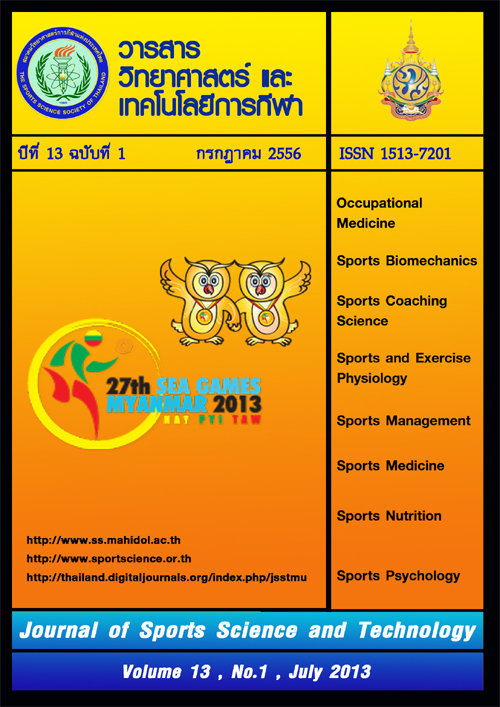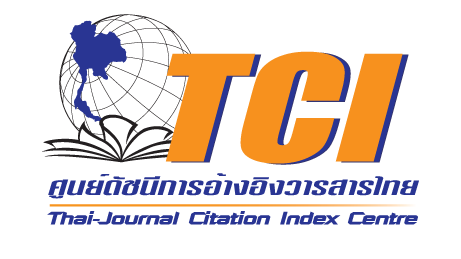Guideline and Strategies of Instructional System Management in line with the Thai Qualifications
Keywords:
Thai Qualifications Framework for Higher Education (TQF), for a bachelor ofAbstract
Abstract
The present research was aimed to 1) acquire the situation and guidelines of instructional system management in line with the TQF, for a Bachelor of Sport Science, Institute of Physical Education, and 2) develop the strategies of instructional system management in line with the TQF, for a Bachelor of Sport Science, Institute of Physical Education.
The research was undertaken in 3 phrases as follows. Phrase 1 : Study on the situation and guidelines of instructional system management in line with the TQF, for a Bachelor of Sport Science, Institute of Physical Education. A 5-point-rating scale questionnaire was used as an instrument. It involves the examination on the levels of knowledge and understanding as well as the instructional practice of instructors, and the level of student self-assessment in 5 domains of standards of learning by TQF. The sample includes a total of 152 executives and instructors of the faculty of sports science and health in 17 campuses of the Institute of Physical Education, and 216 fourth year students of the faculty of sports science and health in the Institute of Physical Education. Data analysis was performed on mean, standard deviation, and percentage. Investigations were made on guidelines for instructional management, instructional management quality policy, issues on higher educational reform for the second round, instructional management research, using documentary analysis. Phrase 2 : Development of strategies using focus group and brainstorming on the internal and external environment (SWOT Analysis), and the strategies were defined based on Weil procedure. Population comprises 36 deans and deputy deans of the faculty of sports science and health, and campus deputy deans. Data record form was used as a tool. Content analysis was applied with the data. The strategies were reviewed in reference of experts. Phrase 3 : Experiment of strategies of instructional management process using the single group and pretest-posttest designs. Instruments consist of course specification (TQF 3) and course report (TQF 5). Population are 17 senior students of 2012 academic year in the faculty of sports science and health of the Institute of Physical Education, Angthong campus. The experiment lasted for 18 weeks, each of which took 1 day for 2 hours. Instruments include the Knowledge Test and Behavioral Assessment Test. Data was analyzed for mean and standard deviation, and test of differences with T-test.
Results
Phrase 1 Instructors of the faculty of sports science and health displayed their knowledge and understanding in the key principles and guidelines for practice of TQF at moderate level ( = 3.43 , S.D. = 0.59), the quality of resource in instructional management at moderate level ( = 3.25 , S.D. = 0.52), the quality of operation on internal educational insurance system and mechanism at moderate level ( = 2.88 , S.D. = 0.65), the quality of operation on instructors and supportive staff development process at moderate level ( = 3.02 , S.D. = 0.59), and practice of code of ethics for instructor at highest level ( = 3.56 , S.D. = 0.64). The survey on the use of instructional strategies and assessment based on the standards of learning suggested that these instructors applied a variety of strategies in accord with the standards of learning. Student self-assessment results indicated high level of learning based on the standards in 2 domains, i.e. moral and ethics ( = 4.27 , S.D. = 0.55), and psychomotor skills ( = 4.39 , S.D. = 0.62), with moderate levels in other domains. Guidelines for TQF-based instructional system management cover 4 aspects including development of curriculum and instruction quality assessment system and mechanism, development of instructor’s research productivity, development of higher education network, and marketing development for increased quantity and quality of students.
Phrase 2 Result on the development of instructional system management strategies based on TQF for a bachelor of sport science, Institute of Physical Education, acquired 5 strategies as follows. 1) Strategy on curriculum and instruction quality assurance system and mechanism, with 11 sub-strategies. 2) Strategy on instructor’s research productivity, with 3 sub-strategies. 3) Strategy on empowerment of higher education network, with 5 sub-strategies. 4) Strategy on marketing penetration for increased quantity And quantity of graduates in sport science major of the Institute of Physical Education with 4 sub-strategies. 5) Strategy on TQF-based instructional process.
Phrase 3 Result on the experiment of TQF-based instructional management process for a bachelor of sport science in the Institute of Physical Education. As a result of assessment using the course report (TQF 5), students exhibited higher level of learning on the standards of moral and ethics, knowledge, cognitive skills, numerical skills, communication and information technology at posttest than at pretest. Students demonstrated their opinions toward the developed instructional management at high level in overall ( = 4.13 , S.D. = .409), and at highest level on the role of instructor ( = 4.6 , S.D. = .521).







